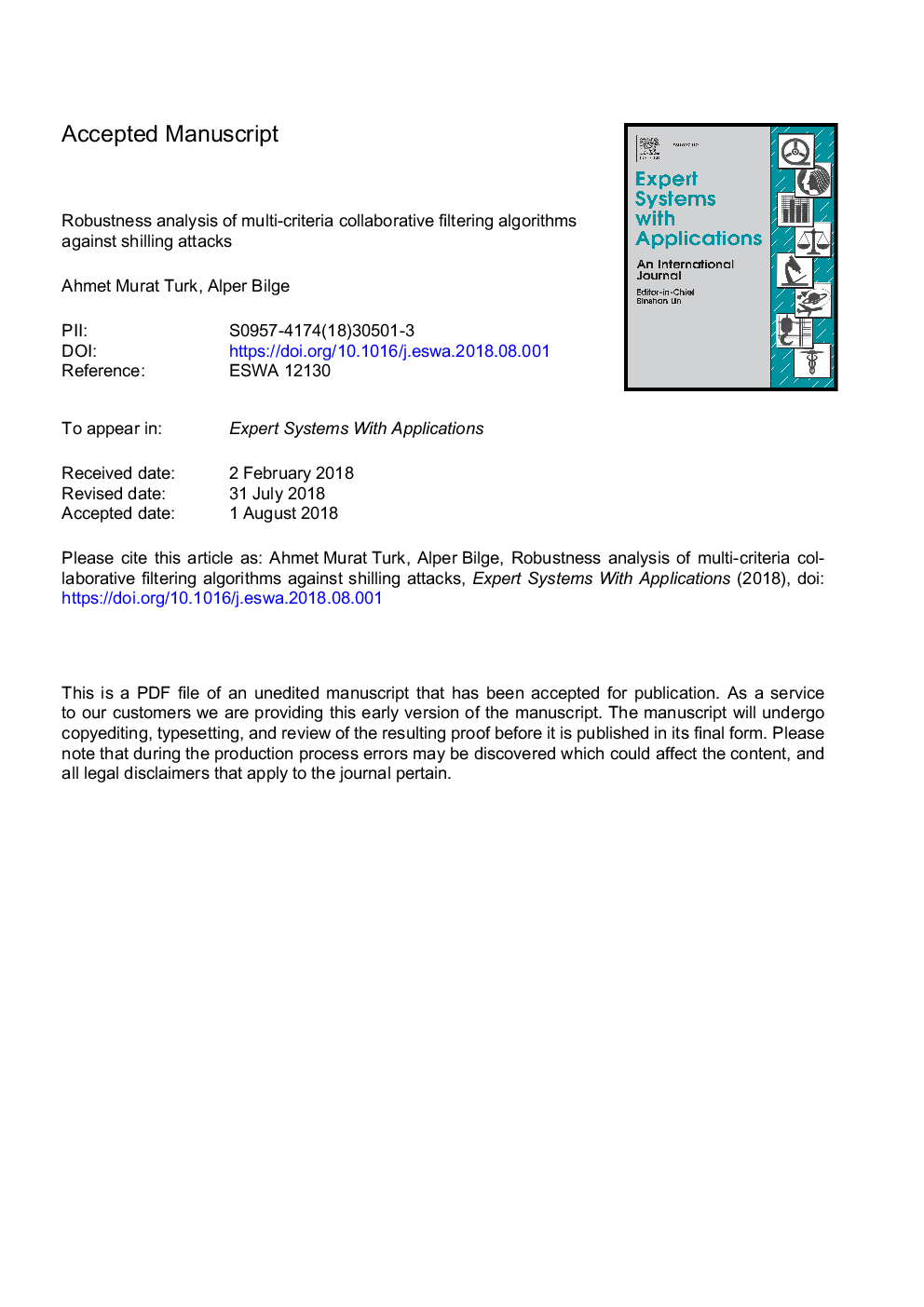| کد مقاله | کد نشریه | سال انتشار | مقاله انگلیسی | نسخه تمام متن |
|---|---|---|---|---|
| 11002287 | 1437591 | 2019 | 30 صفحه PDF | دانلود رایگان |
عنوان انگلیسی مقاله ISI
Robustness analysis of multi-criteria collaborative filtering algorithms against shilling attacks
ترجمه فارسی عنوان
تجزیه و تحلیل استحکام الگوریتم های فیلترینگ مشترک چند معیاره در برابر حملات شیلینگ
دانلود مقاله + سفارش ترجمه
دانلود مقاله ISI انگلیسی
رایگان برای ایرانیان
کلمات کلیدی
فیلتر کردن همگانی، چند معیار، حمله شیلینگ، تزریق مشخصات تجزیه و تحلیل ثبات حمله حالت
ترجمه چکیده
فیلترینگ همکاری یک روش سیستم پیشنهادی در حال ظهور است که هدف آن هدایت کاربران بر اساس ترجیحات دیگر مشتریان با شباهت های رفتاری است. چنین مکاتبات براساس سابقه ترجیحی کاربران استفاده می شود. تمدید نسبتا جدیدی از طرح های فیلترینگ همکاری سنتی نه تنها به میزان اینکه یک کاربر یک مورد را دوست دارد، بلکه دلیل اینکه او مورد را با جمع آوری تنظیمات چند معیاری با تمرکز بر ویژگی های متمایز اقلام، دوست دارد. این سیستم های فیلترینگ متقابل چند معیار بالقوه برای بهبود دقت سیستم توصیه می شود زیرا آنها دیدگاه های متعدد کاربران را در محصولات نشان می دهد. با این حال، به دلیل ارائه توصیه های دقیق تر، چنین سیستم هایی ممکن است حملات مخرب را به مراتب بیشتر از آنچه که سنتی هستند، مورد حمله قرار دهد. مهاجمین تلاش می کنند پروفایل های جعلی را به خروجی های متعصب این سیستم ها به نفع یک محصول خاص یا خود سیستم تحریف کنند. از آنجا که خروجی سیستم های متخصص مستقیما به سیگنال های ورودی بستگی دارد؛ مداخلات به ورودی ها منجر به شکست در تولید چنین سیستم هایی می شود. در این مطالعه، استراتژی های حمله شیلینگ را در برابر مجموعه های ترجیحی چند معیاری بررسی می کنیم، چگونه می توان سناریو های شناخته شده حمله را در برابر این سیستم ها گسترش داد، و پیشنهاد یک طرح حمله دیگر را پیشنهاد می کنیم. ما تجزیه و تحلیل استحکام الگوریتم های پیشنهاد چند معیاره با استفاده از روش های مختلف تجمع شباهت را با طرح های حمله پیشنهاد شده توسط تحقیقات گسترده ای انجام دادیم. نتایج تجربی در داده های دنیای واقعی نشان می دهد که این سیستم ها به دستکاری ها بسیار آسیب پذیر هستند و برای اطمینان از کیفیت توصیه شده لازم است که اقدامات تشخیص مناسب حمله مورد نیاز باشد. با توجه به یافته های ما، تلاش های دستکاری در چنین سیستم های متخصص، فرایند تصمیم گیری را گمراه می کند.
موضوعات مرتبط
مهندسی و علوم پایه
مهندسی کامپیوتر
هوش مصنوعی
چکیده انگلیسی
Collaborative filtering is an emerging recommender system technique that aims guiding users based on other customers preferences with behavioral similarities. Such correspondences are located based on preference history of users. A relatively new extension of traditional collaborative filtering schemes takes into account not only how much a user likes an item, but also why she likes the item by collecting multi-criteria preferences focusing on distinctive features of the items. These multi-criteria collaborative filtering systems have the potential to improve recommender system accuracy since they reveal multiple views of users on products. However, due to providing more insightful recommendations, such systems might be subjected to malicious attacks more substantially than the traditional ones. Attackers attempt to insert fake profiles to bias outputs of these systems in favor of a particular product or disrepute the system itself. Since outputs of expert systems directly dependent on input signals; interventions to the inputs coherently cause failures on productions of such systems. In this study, we examine shilling attack strategies against multi-criteria preference collections, how to extend well-known attack scenarios against these systems, and propose an alternative attacking scheme. We analyze the robustness of baseline multi-criteria recommendation algorithms regarding various similarity aggregation procedures against proposed attacking schemes by the extensive experimental investigation. Empirical results on real-world data demonstrate that these systems are highly vulnerable to manipulations and proper attack detection practices are needed to ensure recommendation quality. According to our findings, manipulative attempts at such expert systems mislead decision-making process.
ناشر
Database: Elsevier - ScienceDirect (ساینس دایرکت)
Journal: Expert Systems with Applications - Volume 115, January 2019, Pages 386-402
Journal: Expert Systems with Applications - Volume 115, January 2019, Pages 386-402
نویسندگان
Ahmet Murat Turk, Alper Bilge,
